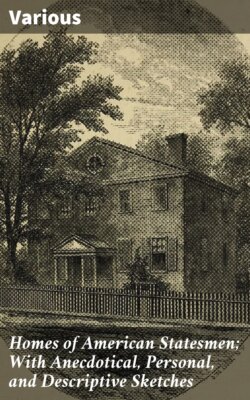Homes of American Statesmen; With Anecdotical, Personal, and Descriptive Sketches

Реклама. ООО «ЛитРес», ИНН: 7719571260.
Оглавление
Various. Homes of American Statesmen; With Anecdotical, Personal, and Descriptive Sketches
Homes of American Statesmen; With Anecdotical, Personal, and Descriptive Sketches
Table of Contents
ILLUSTRATIONS
Fac-similes of Letters
Washington
WASHINGTON
1732—1799
Franklin
FRANKLIN
Jefferson
JEFFERSON
Hancock
HANCOCK
John Adams
JOHN ADAMS
Patrick Henry
PATRICK HENRY
Madison
MADISON
Jay
JAY
Hamilton
HAMILTON
Marshall
MARSHALL
Ames
AMES
JOHN QUINCY ADAMS
JACKSON
King
RUFUS KING
Clay
CLAY
Calhoun
CALHOUN
Clinton
CLINTON
Story
STORY
Wheaton
WHEATON
WEBSTER
Footnotes
Отрывок из книги
Various
Published by Good Press, 2021
.....
"I am, &c."
When the object for which he had undertaken the campaign—viz.: the undisturbed possession of the Ohio River—was accomplished, Washington resigned his commission, after five years of active and severe service, his health much broken and his private affairs not a little disordered. The resignation took effect in December, 1758, and in January, 1759, he was married, and, as he supposed, finally settled at Mount Vernon—or, as he expresses it in his quiet way—"Fixed at this seat, with an agreeable partner for life, I hope to find more happiness in retirement than I ever experienced amidst the wide and bustling world." And in liberal and elegant improvements, and the exercise of a generous hospitality, the young couple spent the following fifteen years; the husband attending to his duties as citizen and planter, with ample time and inclination for fox-hunting and duck-shooting, and the wife, a kind, comely, thrifty dame, looking well to the ways of her household, superintending fifteen domestic spinning-wheels, and presiding at a bountiful table, to the great satisfaction of her husband and his numerous guests. When the spirit of the people began to rise against the exactions of the mother country, Washington was among the foremost to sympathize with the feeling of indignation, and the desire to resist, peaceably, if possible, forcibly if necessary. Of this, his letters afford ample proof. When armed resistance was threatened, Washington was immediately thought of as the Virginia leader. When Congress began, in earnest, preparations for defence, Washington was chairman of all the committees on the state of the country. When the very delicate business of appointing a commander-in-chief of the American armies was under consideration, Washington was the man whose name was on every tongue, and who was unanimously chosen, and that by the direct instrumentality of a son of Massachusetts, though that noble State, having commenced the struggle, might well have claimed the honor of furnishing a leader for it. What generosity of patriotism there was, in the men of those days, and how a common indignation and a common danger seem to have raised them above the petty jealousies and heart-burnings that so disfigure public doings in time of peace and prosperity! How the greatness of the great man blazed forth on this new field! What an attitude he took before the country, when he said, on accepting the position, "I beg leave to assure the Congress that as no pecuniary consideration could have tempted me to accept this arduous employment, at the expense of my domestic ease and happiness, I do not wish to make any profit from it. I will keep an exact account of my expenses. These, I doubt not they will discharge, and that is all I desire." There was a natural, unconscious sovereignty in thus assuming to be the judge of what it might be proper to expend, in concerns the most momentous, extensive, and novel, as well as in taking the entire risk, both of payment and of public approbation,—in a direction in which he had already found the sensitiveness of the popular mind,—that equals any boldness of Napoleon's. We can hardly wonder that, in after times, common men instinctively desired and expected to make him a king.
.....